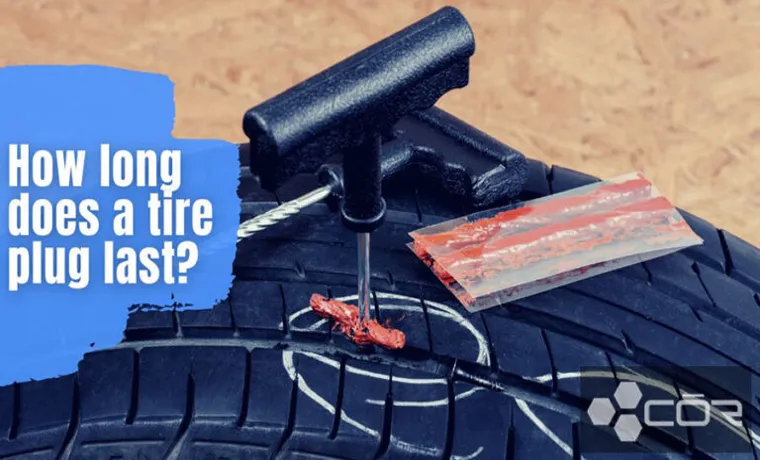Have you ever experienced a flat tire while driving? It’s an inconvenience that nobody wants to deal with. Fortunately, tire plugs offer a quick and easy solution that can get you back on the road in no time. Tire plugs are small pieces of rubber that can be inserted into small punctures in the tire.
While they are a popular and widely used solution, many drivers wonder how long tire plugs actually last. After all, the last thing you want is to be stranded on the side of the road with another flat tire. In this blog post, we’ll take a closer look at tire plugs and answer the question of how long they can be expected to last.
Table of Contents
Understanding Tire Plugs
If you’ve recently been in a situation where you had to plug your car’s tire, you may be wondering just how long that plug is going to last. Most tire plugs will last for the life of the tire but may need to be checked periodically to ensure that the plug is still holding strong. That being said, it’s important to note that not all tire plugs are created equal.
Some cheaper plugs may deteriorate more quickly and require replacement sooner than others. It’s always best to invest in high-quality tire plugs from reputable brands to ensure that you’re getting a product that will withstand the test of time. Additionally, driving conditions, climate, and other factors may affect the longevity of your tire plug, so it’s important to keep an eye on your tire’s overall health and address any issues as soon as they arise.
Overall, with the right care and attention, a well-installed tire plug should last for the life of your tire.
What Are Tire Plugs?
Tire plugs are a quick and easy way to repair small punctures in your tires. Basically, a tire plug is a small rubber plug that is inserted into the punctured area of your tire. The plug fills the hole and seals the area, preventing any air from escaping.
This allows you to quickly and easily fix the tire without having to replace it entirely. Tire plugs are a popular choice for drivers because they are inexpensive, easy to use, and can be done at home without any special tools or expertise. Plus, they are a great way to extend the life of your tires and prevent the need for costly replacements.
So if you have a puncture in your tire, consider using a tire plug to fix it quickly and easily.
How Are Tire Plugs Installed?
Tire plugs are a handy solution for fixing small punctures in your vehicle’s tires. They’re generally easy to install and can help keep your tires functioning normally until you’re able to get them fully repaired. So, how are tire plugs installed? Firstly, you need to locate the puncture in the tire.
This can be done visually or with the help of a tire pressure gauge. Once you’ve located the puncture, use a tire plug kit to insert the plug into the hole. This typically involves lacing the plug through a needle and pushing it through the puncture.
The plug will expand inside the tire and create a seal, which should hold air and prevent further damage. It’s important to keep in mind that tire plugs are a temporary solution and not suitable for all types of punctures. Always refer to your vehicle owner’s manual or consult a professional if you’re unsure about whether a tire plug is appropriate.
When Are Tire Plugs Suitable?
Tire Plugs Tire plugs are a quick and easy solution to fixing a punctured tire. They are suitable in certain circumstances, such as when the puncture is small and on the tread of the tire. If the puncture is larger than a quarter of an inch or on the sidewall of the tire, a tire plug may not be a suitable repair method.
It is important to remember that a tire plug is only a temporary solution and should be used as such. It is always recommended to have a professional inspect and repair the tire as soon as possible. Additionally, tire plugs should not be used on tires that are more than five years old or have sidewall damage, as the integrity of the tire may have been compromised.
In summary, tire plugs can be a suitable solution for small punctures on the tread of a tire, but it is important to use them as a temporary fix and have a professional conduct a proper repair.
Determining the Longevity of Tire Plugs
If you’ve had to repair a punctured tire with a plug, you’re probably wondering how long that plug will last. The lifespan of a tire plug can vary depending on a few factors. In general, if the plug is correctly installed and the puncture is in the tread of the tire, the plug can last for the remaining lifespan of the tire.
However, if the puncture is closer to the sidewall or the tire has suffered severe damage, the plug may only last a few thousand miles. It’s important to keep an eye on the tire and check for any signs of leaking or damage. If you notice any issues, it’s crucial to replace the tire or repair it again as soon as possible to maintain your safety on the road.
Always consult with a professional tire technician for further guidance on tire plug longevity and maintenance.
Factors That Affect the Life of a Tire Plug
Tire Plug Life When it comes to the longevity of a tire plug, several factors come into play. One of the most critical factors is the type of tire you have. For instance, if you have a high-performance sports car, the tire plugs may not last as long as they would on a regular passenger car.
Another essential factor is the driving conditions you encounter daily. Rough terrain, sharp turns, and frequent stops can wear down your tire plugs faster than smooth roads and steady driving. Proper installation of the tire plugs is also crucial to their longevity.
If installed incorrectly, the plugs may begin to leak air, leading to a loss of pressure in your tires. Therefore, it’s essential to have a professional technician install your tire plugs to ensure they’re placed correctly. Finally, regular maintenance, such as checking the air pressure and keeping your tires properly inflated, can extend the life of your tire plugs significantly.
By ensuring your tires are well-maintained and installed, you can enjoy the benefits of your tire plugs for a long time.
Average Lifespan of a Tire Plug
When you have a punctured tire, using a tire plug can be a quick and easy solution. But how long does a tire plug really last? The lifespan of a tire plug depends on a variety of factors, such as the location and size of the puncture, the quality of the plug, and how well it was installed. On average, a tire plug can last anywhere from a few weeks to a few months or even longer.
However, it’s important to note that a tire plug should only be seen as a temporary fix until a proper repair can be made. Driving on a plugged tire for an extended period of time can be dangerous and lead to further damage. So, while a tire plug can be a convenient solution in a pinch, it’s always best to have your tire professionally repaired or replaced as soon as possible.
Signs That a Tire Plug Needs Replacement
Determining the longevity of a tire plug can be tricky business. While tire plugs are often an effective solution to fix punctured tires, they are not meant to be a permanent fix. In fact, you should only use a tire plug as a temporary fix until you can get to a professional tire specialist.
However, determining when a tire plug needs replacement can be difficult. One clear sign that a tire plug needs to be replaced is if you notice a reduction in tire pressure. Another sign is if the plug begins to leak air.
It’s important to note that if you notice any of these signs, you should get your tire inspected by a professional as soon as possible. While tire plugs can be a convenient fix, they do have their limitations and it’s crucial to be aware of these limitations to ultimately prioritize your safety and vehicle longevity.
Maintaining Tire Plugs
If you’ve ever had a tire punctured, you know how convenient it can be to use tire plugs to fix the issue quickly. But how long are tire plugs good for, and can they be used indefinitely? The answer is that tire plugs are a temporary fix, and they should be monitored and maintained regularly. On average, tire plugs last between 6 and 10 months, but this can vary depending on factors such as the size of the puncture, the tire’s age, and the quality of the plug.
It’s recommended to have your tire inspected every time it’s serviced, and any plugs that show signs of wear or damage should be replaced. If you’re unsure if your tire plugs are still functional, take your vehicle to a reputable mechanic for a professional opinion. Remember, using a tire plug is a stop-gap measure, and it’s vital to replace the tire as soon as possible for your safety on the road.
Checking Tire Plugs Regularly
Maintaining tire plugs is an essential aspect of ensuring your tires remain in good condition for optimum performance. It is essential to check tire plugs regularly to ensure they are holding up well and do not need replacement. Driving on a tire with a plug that has become dislodged can result in a sudden loss of pressure, leading to loss of control, accident, and even injury.
Therefore, regularly checking the condition of your tire plugs can help prevent unexpected accidents. It is a good idea to check your tire plugs every time you fuel up, especially if you have had any recent road hazards or bumps. Inspecting the plugs is simple enough.
All you need to do is check if they are still securely in place, and no leakage is occurring. Maintaining tire plugs is crucial for safe driving, and ensuring you and your passengers’ safety on every journey.
How Often Should Tire Plugs Be Checked?
Tire Plugs Maintaining tire plugs is an essential aspect of ensuring your vehicle’s safety and performance. Even if your vehicle has new and properly inflated tires, a tire puncture can occur at any time. Tire plugs are one of the most cost-effective ways to repair punctured tires.
However, tire plugs are not designed to last forever, and they need routine maintenance to prevent them from becoming dangerous. Experts recommend checking your tire plugs once every year or at the very least, whenever you notice something off with your tire’s pressure or performance. Careful inspection will also help you know if your tire plugs need to be replaced.
While the exact timeframe for maintaining tire plugs can vary based on the brand and the type of tire plugs you have, taking care to check them regularly will ensure that they function optimally and protect you on your journey. Remember that tire plugs are only a temporary solution for punctured tires, and at some point, they will need to be replaced.
Conclusion
In the world of tire repairs, plugs may seem like the quick and easy solution, but just how long can you rely on them? Well, it all depends on a few factors – the size and location of the puncture, the type of plug used, and the condition of the tire itself. Generally, a properly installed tire plug can last for thousands of miles, but it’s always best to have any tire damage assessed by a professional. So, if you want to stay on the road for the long haul, remember to treat your tires with the respect they deserve – after all, they’re the only thing standing between you and a flat-out disaster!”
FAQs
What is a tire plug and how does it work?
A tire plug is a small piece of rubber used to seal punctures in a tire. It is inserted into the puncture and provides a temporary fix until the tire can be replaced or properly repaired.
Can tire plugs be used as a permanent fix for a punctured tire?
No, tire plugs should always be considered a temporary solution. It is important to have the punctured tire inspected and repaired or replaced as soon as possible, as the tire plug may not hold up over time.
What kind of punctures can be repaired with a tire plug?
Tire plugs are only effective in repairing small punctures in the tread area of the tire. Punctures in the sidewall or shoulder of the tire cannot be repaired with a plug.
How long can a tire plug be expected to hold up before it needs to be replaced?
A tire plug may last anywhere from a few days to several months, depending on the size and location of the puncture, as well as the quality of the plug used. However, it is important to have the tire inspected and repaired or replaced as soon as possible.
Can a tire plug be used on a run-flat tire?
No, tire plugs are not recommended for use on run-flat tires. These tires are designed to be driven on even when they are flat, and require a specialized repair process.
Can a tire plug be used on a tire that has already been repaired with a patch?
In most cases, no. It is not recommended to use a tire plug on a tire that has already been repaired with a patch, as this may compromise the integrity of the tire and lead to further damage.
Are tire plugs a DIY repair or should they be done by a professional?
While it is possible to repair a tire with a plug yourself, it is recommended to have the repair done by a professional tire technician. Improper installation of a tire plug can lead to further damage and potential tire failure.



